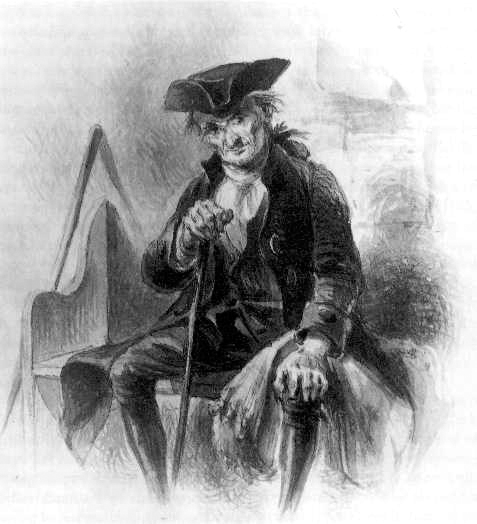One of Washington Irving's famous office Christmas parties.
After receiving a lump of coal, mined by child workers, in his stocking, a pensive Boz reflects on his literary crimes.
Born a true "marble baker" in New York Town in 1783, Washington Irving is best known as the author of those cautionary tales of Dutch-American excess "The Legend of Sleepy Hollow" and "Rip Van Winkle." But his Christmas stories, set in a semi-fictional English countryside of yore, were just as popular in their day, first appearing in the serialized compilation The Sketch Book of Geoffrey Crayon, Gent. (1819-20).
A sketch of Irving, tricorner'd master of the sketch-book.
Irving, despite being a Yank, was hailed by the Briterati as the first writer of European quality America had produced (sorry, "Tenth Muse"). Perhaps this was because Irving established a home base (or "wicket," as it's called in the U.K.) in merry old England, moving there in 1815, after the Irving family business (George Washingtonalia) went under, and living there on and off until 1832.
Good tidings I bring to you and your kin! (Careful, don't eat the poison-laden holly!)
While in England, Irving insisted -- perhaps the result of lead poisoning from his favored tricorn hats -- on using a pseudonym for both business and pleasure. These pen-names included Jonathan Oldstyle, Diedrich Knickerbocker, the aforementioned Crayon, Launcelot Langstaff, Irv Washingstein, and James Fenimore Cooperstown.
Gate-spelling, like constructed ruins, one of the many fads among the Georgian country-estate-set.
Irving wrote five stories in all--"Christmas"; "The Stage-Coach"; "Christmas Eve"; "Christmas Day"; and "Christmas Dinner"--that serve as an abbreviated advent calendar in narrative form.
"Christmas" is an essay extolling the virtues of old English yuletide traditions. Irving writes of the spirit of the season:
Stranger and sojourner as I am in the land -- though for me no social hearth may blaze, no hospitable roof throw open its doors, nor the warm grasp of friendship welcome me at the threshold -- yet I feel the influence of the season beaming into my soul from the happy looks of those around me. Surely happiness is reflective, like the light of heaven, and every countenance bright with smiles and glowing with innocent enjoyment is a mirror transmitting to others the rays of a supreme and ever shining benevolence. He who can turn churlishly away from contemplating the felicity of his fellow beings and sit down darkling and repining in his loneliness when all around is joyful may have his moments of strong excitement and selfish gratification, but he wants the genial and social sympathies which constitute the charm of a merry Christmas.
Okay, so his writing is as antiquated as the fading Christmas traditions he profiles, but his heart's in the right place.
Decor of yore.
"The Stage-Coach" is an account of Irving's trip to the fictional Bracebridge Hall, during which the author and his riding companions have their Christmas spirit tested by a rowdy gang of highwaymen. The final three stories, "Christmas Eve," "Christmas Day," and "Christmas Dinner," recount the holiday festivities in the Wodeshousian family seat Bracebridge, a place filled with patrician yet rustic good cheer. Irving writes of Christmas Eve night:
The party now broke up for the night...As I passed through the hall on the way to my chamber, the dying embers of the Yule clog still sent forth a dusky glow; and had it not been the season when 'no spirit dares stir abroad,' I should have been half tempted to steal from my room at midnight and peep whether the fairies might not be at their revels about the hearth.
What is the blazes is a "Yule clog"?
Ye Olde Shambolic Caroling in the village church (L), and Christmas conviviality with the Farmer of Christmas Past (R).
Well, I encourage you to check out Irving's tales of Christmas for yourselves. They are Tiny-Tim-free and heavy-handed moralizing free (well, not entirely). Much to the Ghost of Washington Irving's chagrin, my technophilic and gizmaniacal "friends" tell me that they are copyright-free and easily downloaded to your Kindle, Nook, iPad, iPhone, Android, or SonyReader -- whatever those are.




No comments:
Post a Comment